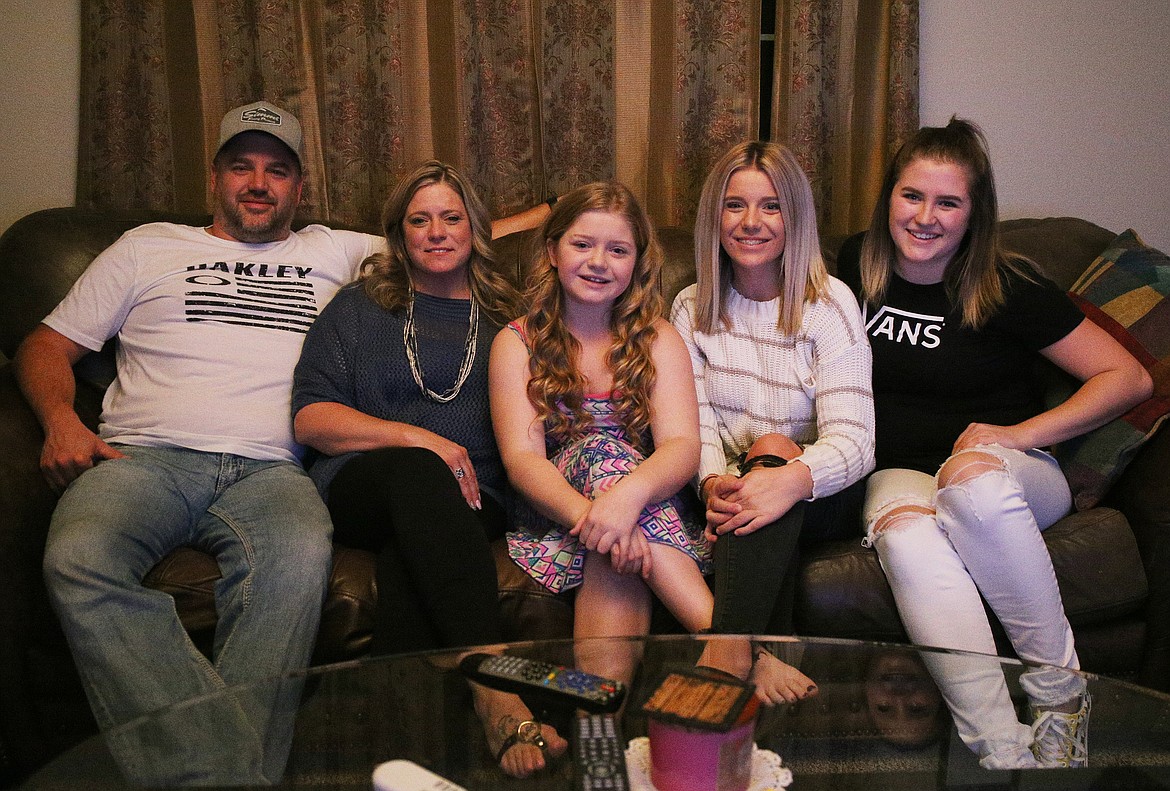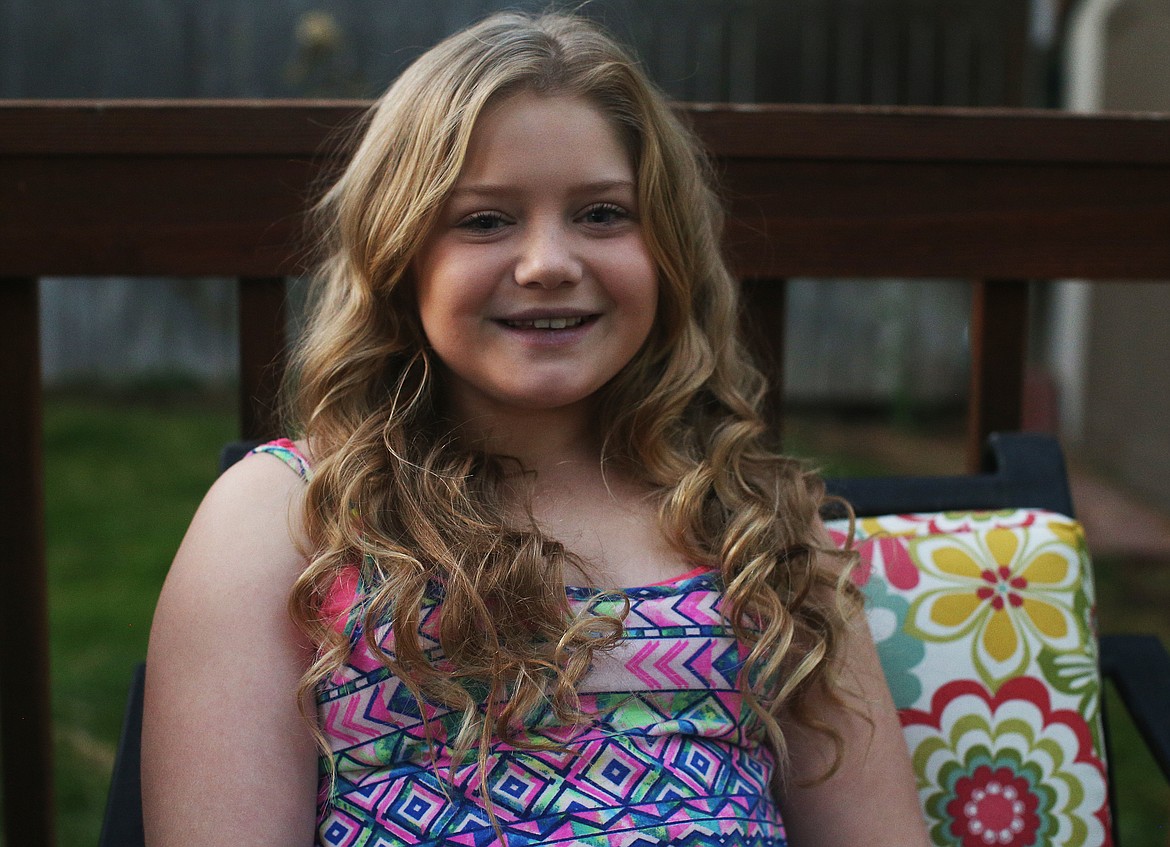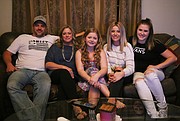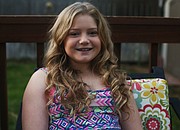It strikes like lightning: A look into childhood cancer
POST FALLS — Danika Keyser is an articulate, chatty and bright 12-year-old.
The River City Middle School sixth-grader steals the show with her storytelling and contagious sweetness. Listeners can't help but smile as she talks about nurses teaching her a crazy new dance, endless popsicles in the pediatric oncology ward freezer, and the stuffed monkey that fills in for her when she misses school — a monkey her classmates cleverly named "Danika the Monkey."
"It’s a way for the class to feel connected to me when I’m not there," Danika explained, seated around her grandma's kitchen table with her parents and sisters Alex, 18, and Rylee, 15. "The students get to interact with the monkey, like if it’s writing time they’ll give it a piece of paper and make it hold a pen."
Missing school has become part of the routine for Danika, who frequently goes in for vision checks, blood tests and appointments with specialists who help keep her chronic myelogenous leukemia (CML) and its symptoms under control.
Danika was diagnosed with this uncommon blood cell cancer in February 2015 when she was just 8.
"All I knew was I didn’t feel normal. I just felt sick," she said. "I had a feeling it wasn't something I've had before, just because of the symptoms I’ve had. My body aches — I get them when I'm sick, but not how they were. When they told me it was leukemia, I had no idea what to think. I was in complete shock."
Living with leukemia
With no history of pediatric cancer in the family, Danika's parents, Jerod and Amber, were also confounded when doctors told them she had leukemia, not the flu or mononucleosis like they had thought. Or hoped.
"My initial thought was, 'They’re wrong. They haven’t given us enough testing to prove to me that they know what they're talking about,'" Amber said. "I tried to convince them to convince me that it was just an infection and it would be an easy cure."
Danika's leukemia is also a tricky one. It's a form that is seldom found in children.
"It’s such an adult form that they don't even have a treatment protocol for kids, so she takes the same chemo that my 60-year-old friend who has the same disease does," Jerod said. "Hers is very rare and she'll have it forever."
The more common child leukemia, acute lymphocytic leukemia (ALL), affects blood, bone marrow and white blood cells and can eventually go into remission.
But Danika's form is a lifelong affliction.
"The best that they have is that she takes chemo every day for the rest of her life," Jerod said. "The goal is, through research and medicine and breakthroughs, that that becomes no longer the standard procedure, whether something better comes along or there's a pill that she takes and she's done, or there's an aggressive 3-month or 6-month chemo treatment that at the end, you’re out of the woods."
Danika spent two weeks in Sacred Heart Children's Hospital in Spokane when she was first diagnosed. It's the only facility in the region that treats pediatric cancer patients and is a part of the Alliance for Cancer Care with Kootenai Health and Cancer Care Northwest, an alliance formed to help patients in North Idaho have access to the cancer care they need.
One of the Sacred Heart nurses found Danika to share some hope. That nurse had the same leukemia, diagnosed around the same age as Danika. She’s now 31 with a family. And she takes her chemo every day.
Danika's not limited by her condition, but her growth will be stunted and she will always have to be aware of her health and cognizant of head injuries and lacerations, as clotting will be an issue for the rest of her life.
"The biggest thing for me was trying to accept the fact that this is a lifetime adjustment for us. It’s not just a year, two years. It’s definitely a lifetime," Amber said. "Knowing that as of right now she will not ring the (free of cancer) bell, it was hard to accept."
Embraced by the cancer community
Danika's initial time in the hospital was daunting for her family, especially considering that her diagnosis came only four days after she began complaining about not feeling well.
"I remember feeling my scalp and my hairline tingle and I really thought I was going to pass out," Jerod said, recalling the moment he received the news. "I felt like it was almost like an out-of-body experience."
If he had fallen, one of the many supportive hospital staff and medical professionals would have caught him. In the midst of that gut-wrenching time in their lives, the Keysers were distracted, entertained, fed, comforted and kept afloat by the many individuals who work in Sacred Heart's pediatric oncology wing.
Jerod has a cardiologist friend who works on the fourth floor, who offered his support immediately.
"He was quick to say things like, ‘Listen, childhood cancer is completely different than adult forms of cancer and we’ve made progress in the last 10 years with her disease unlike anything else in cancer,’” Jerod said. "Literally the next day (after admitting Danika to the hospital), I woke up in the chair and he was sitting on her bed. It was great to have someone say, 'Listen, I can’t tell you it's going to be OK, but I can tell you it’s not as scary as you think it is.'"
Meanwhile, nurses bonded with Danika and her sisters. The girls got to know the staff quite well, and even the janitor popped in to bring some sunshine their way.
“The oncology ward was unreal," said Alex. "There are nurses there whose whole job is just to come in and play and to have fun with the kids. They have dogs there all the time.”
"It was the happiest saddest place on Earth,” Jerod said.
Wishes come true
The doctor treating Danika put her on the list for the Make-A-Wish Foundation, a nonprofit that makes dreams come true for sick kids. Danika's wish was to go with her family on a Caribbean cruise — and they did, last October.
The bubbly 'tween again lit up as she described dolphin kisses, elaborate waterslides and having her hair braided into cornrows in Jamaica.
"I had pink, blue and white beads on the end of them," she said, running her hand through her blonde hair. "I was in love with my cornrows."
The family has fond memories of that trip; they were treated like a VIP party everywhere they went.
"Everybody on that ship knew who she was,” Jerod said. “Everything from front-row tickets at any event she wanted to go to, to going backstage and meeting the actors and the actresses. There was no question; it was full-on celebrity status the whole time."
And for that week, the Keysers were able to be carefree and forget about what sent them on holiday in the first place.
"There’s a tremendous amount of kids out there literally fighting for their lives," Jerod said. "To go on a cruise ship and swim with the dolphins, all of that goes away, even if it’s for a week. That's a day in the sunshine. That’s a week in heaven."
It’s not easy
Every year in the U.S., nearly 16,000 children from birth to age 19 are diagnosed with cancer. The American Childhood Cancer Organization, www.acco.org, states that every three minutes, somewhere in the world a child is diagnosed with cancer.
"Overall, nationally, children's cancer is increasing slightly," said Dr. Judy Felgenhauer, a physician who leads a group of pediatric oncologists at Sacred Heart Children's Hospital. "One theory is that we're exposed to more carcinogens, living in our modern world. The other thought is that our children are not exposed to as many antigens anymore ... It's all speculation, so nobody really knows."
Felgenhauer has been in the field since 1981. She enjoys getting to know her young patients, whom she tends to see for a long time.
"I love the continuity I get with patients," she said. "Once I meet someone with cancer, I will continue to follow them for as many years as they're willing to come see us."
She has the job of delivering that life-changing news to families that their child has cancer, and it's something she and her colleagues handle with tremendous care.
"The first big hurdle is you've rocked their world. You may have turned their world upside down," Felgenhauer said. "We explain that the doctors are at the top of this pyramid of a very large group of multi-specialty people who will help them through this."
She said they approach all of their patients with the idea that they're going to cure them.
"For all of us, one of our worst nightmares is losing a child or a grandchild or a child close to us," she said. "If we’re not going to be able to cure a child, we feel very privileged to walk that path with them until the end of life. But it's not easy."
Why it matters
The Keyser family spends nearly $15,000 a month just on Danika's chemo pills, and her overall care easily costs $300,000 per year. Thankfully, they have tapped into programs to help with the costs, but not all families are that lucky. Jerod said without assistance, "we wouldn't live here."
"We’d live in a place where there’s socialized medicine," he said. "We’d have to.”
"The financial burden brings a lot of stress,” Amber said. “When you have a lot of stress, it could cause turmoil in your home. There are a lot of people we see at the children’s hospital and that breaks my heart because I know that they don’t have the means or wellbeing to be comfortable like we are fortunate to be ... Not only are they dealing with the pressures of having a sick child, the financial side is unbearable. There’s enough stress being sick to have to deal with the financial side as well."
A lack of funding for pediatric cancer and its patients only compounds the burden, financially and emotionally.
"There’s advances in medicine every day, there’s a tremendous amount of testing,” Jerod said. "The problem is that of all the billions of dollars a year that are donated to cancer research, less than 3 percent of that goes to childhood cancer."
Fundraisers and awareness campaigns include dedicating September as Childhood Cancer Awareness Month to help generate support for research and help for struggling families.
Felgenhauer said people are passionate about the cause because it's so easy for people to put themselves in the situation of families experiencing it.
"Everyone recognizes this is random, that you can't protect your child against getting cancer," she said. "This is like a lightning bolt."
Jerod said nothing impacts a family like childhood cancer, and it’s something that should be at the forefront of people's minds.
"No child should have their childhood robbed from them because of a disease like this," he said. "It is absolutely true that no child should fight alone."





